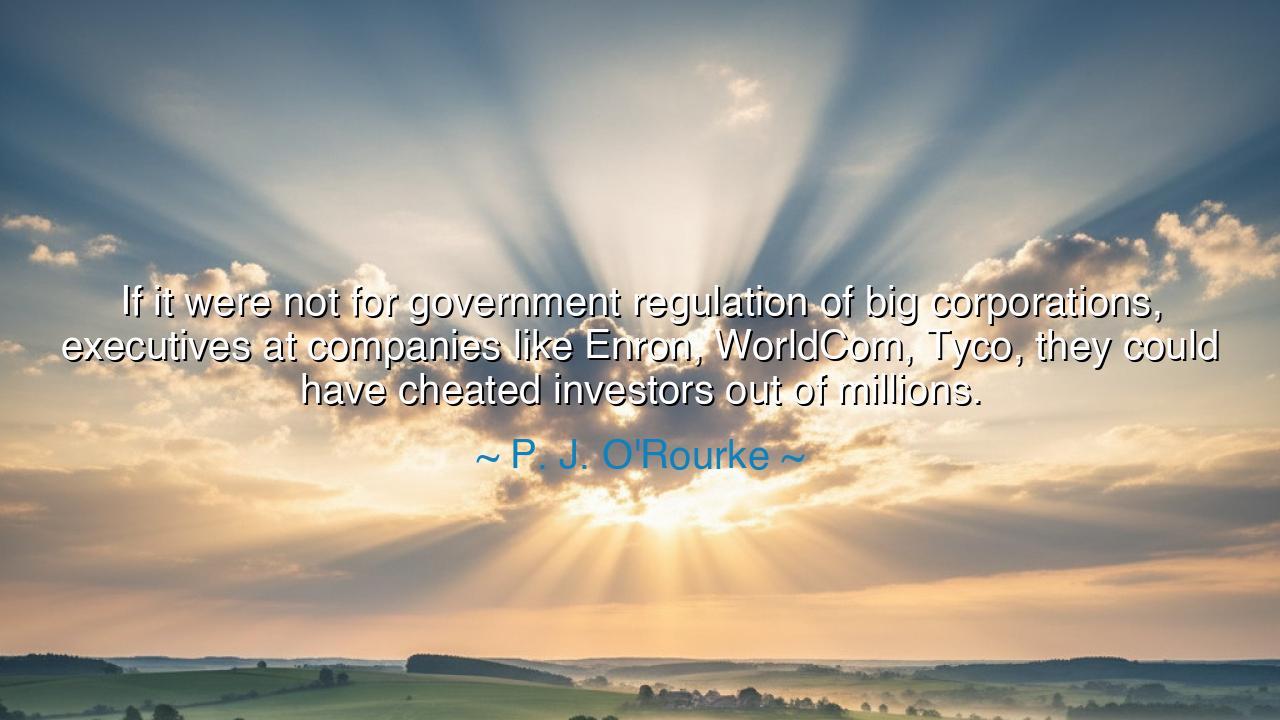
If it were not for government regulation of big corporations
If it were not for government regulation of big corporations, executives at companies like Enron, WorldCom, Tyco, they could have cheated investors out of millions.






"If it were not for government regulation of big corporations, executives at companies like Enron, WorldCom, Tyco, they could have cheated investors out of millions." – P. J. O’Rourke
In these words, P. J. O’Rourke, the sharp-witted American political satirist, delivers a truth that cuts through the fog of ideology: that even in the lands of freedom and enterprise, unrestrained power corrupts. He reminds us that government regulation—often derided as a burden—is in truth the shield of the people, the safeguard against the cunning and avarice of those who command the engines of commerce. For when gold becomes god, conscience becomes its first sacrifice. The warning O’Rourke offers is not against capitalism itself, but against unchecked greed, which, left to its own devices, can consume the moral foundations of society.
To understand his meaning, we must recall the darkness that fell upon the early years of the twenty-first century. The mighty towers of Enron, once a symbol of American innovation, crumbled in scandal. Its executives manipulated earnings, created false subsidiaries, and deceived both regulators and investors. Thousands lost their savings, their pensions, their faith in the markets themselves. Soon after came WorldCom, Tyco, and others—empires built on illusion, maintained by deceit, and destined to collapse beneath the weight of their own corruption. O’Rourke’s quote arose from this age of moral decay, when corporate fraud exposed the limits of self-policing and revealed the necessity of vigilant oversight.
In ancient times, the Greeks spoke of hubris—the arrogance that invites ruin. The story of Enron is a modern myth of hubris. Its leaders believed themselves too clever to be bound by law, too powerful to be punished. They soared like Icarus on wings of deceit until the heat of truth melted their fraud. And when they fell, they dragged thousands of innocent lives down with them. Such is the fate of those who mistake wealth for virtue and cleverness for wisdom. Regulation, then, is not the enemy of freedom; it is the balance that keeps liberty from collapsing into chaos.
Consider also the story of the Great Depression, when unregulated speculation brought ruin to millions. Out of that calamity rose the Securities and Exchange Commission (SEC), a guardian forged by suffering. Laws were written not to chain enterprise, but to protect it from its own excesses. Those laws were not the hand of tyranny, but the hand of justice, ensuring that ambition served the people, not preyed upon them. O’Rourke, with his trademark irony, reminds us that only through such structures can a free market remain truly free—free from deceit, manipulation, and exploitation.
It is tempting in every age to believe that markets, left alone, will purify themselves—that virtue will spring from profit, and fairness from competition. But history, again and again, proves otherwise. Without accountability, the powerful grow reckless. Without rules, trust withers. And when trust dies, so too does prosperity, for commerce itself is but the exchange of faith between people. Thus, the law is not a cage but a scaffold, holding aloft the fragile architecture of civilization.
The lesson of O’Rourke’s words is clear: freedom must walk hand in hand with responsibility. A nation without regulation becomes a feast for the ruthless. To despise oversight is to forget that every law written in ink was first written in suffering. The guardrails of governance were built by those who paid dearly for their absence. When we protect them, we honor their pain and preserve the peace their lessons purchased.
Therefore, let each citizen remember: vigilance is not the duty of governments alone. Every voter, every worker, every investor must demand integrity from those who hold power over the common good. Support laws that protect the honest and restrain the corrupt. Speak when silence would serve deceit. For the health of a nation’s markets, like the health of its soul, depends not on wealth, but on honor governed by justice. And where justice stands watch, corruption cannot long endure.






AAdministratorAdministrator
Welcome, honored guests. Please leave a comment, we will respond soon